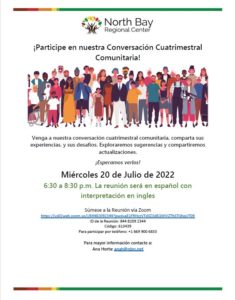

Please visit the following link to join: https://bit.ly/communityqtlyconvo


Please visit the following link to join: https://bit.ly/communityqtlyconvo

NBRC is both pleased and encouraged to share the findings that includes our very own, Dr. Katie Pedgrift regarding the importance of social-sexual understanding for people with neurodevelopmental disabilities! Learn more by visiting the link below:
The Next Board Meeting is on July 6, 2022 at 6:00 pm via Zoom.
Please click the link below to join the Zoom Meeting:
https://us02web.zoom.us/j/89709687840?pwd=QjlIcTc0dzBBNXA2OEpLanVjOFltUT09
Or Telephone: 1 669 900 6833
Webinar ID: 897 0968 7840
Password: 912329
Please contact (707) 850-8404 for information or accommodations. Spanish translation services are provided.
Se Habla Español
The Next Board Meeting is on June 1, 2022 at 6:00 pm via Zoom.
Please click the link below to join the Zoom Meeting:
https://us02web.zoom.us/j/81353176378?pwd=NEUvNTd2LzNJRlNvY3ZIQkJ5c09JQT09
Or Telephone: 1 669 900 6833
Meeting ID: 813 5317 6378
Password: 573404
Please contact (707) 256-1224 for information or accommodations. Spanish translation services are provided.
Se Habla Español
The Next Board Meeting is on May 4, 2022 at 6:00 pm via Zoom.
Please click the link below to join the Zoom Meeting:
https://us02web.zoom.us/j/89709687840?pwd=QjlIcTc0dzBBNXA2OEpLanVjOFltUT09
Or Telephone: 1 669 900 6833
Webinar ID: 897 0968 7840
Password: 912329
Please contact (707) 256-1224 for information or accommodations. Spanish translation services are provided.
Se Habla Español
NBRC is pleased to announce the reopening of our offices to the community! Stay tuned!

The Next Board Meeting is on April 6, 2022 at 6:00 pm via Zoom.
Please click the link below to join the Zoom Meeting:
https://us02web.zoom.us/j/89709687840?pwd=QjlIcTc0dzBBNXA2OEpLanVjOFltUT09
Or Telephone: 1 669 900 6833
Webinar ID: 897 0968 7840
Password: 912329
Please contact (707) 256-1224 for information or accommodations. Spanish translation services are provided.
Se Habla Español



The NBRC Board Opportunity Fund is a worthwhile benefit that assists clients and families served by NBRC to experience a full range of support, activities and progress in their lives. Any and all donations are greatly appreciated.
The Association of Regional Center Agencies (ARCA) represents the autonomous regional centers objective to support and advance the intent and mandate of the Lanterman Developmental Disabilities Services Act. To learn about important legislative updates and current initiatives.
Disability Rights California is a nonprofit agency. They are the largest disability rights group in the nation. Federal law is established to protect and advocate for the rights of people with disabilities. They are the protection and advocacy agency for California.
610 Airpark Rd.
Napa, CA 94558
Telephone (707) 256-1100
Fax (707) 256-1255
TDD (707) 257-0213
(800) 884-1594 (evenings/weekends)
(0-36 months)
Napa/Solano Counties (800) 646-3268
Sonoma County (707) 755-5113
(707) 751-0171 (Fax)
(3 and over)
(833) 264-4335 / Intake@nbrc.net
We obtain consent by verbally asking if you agree to receive conversational text messages from North Bay Regional Center. Message frequency varies. Message and data rates may apply. For assistance, text HELP, email support@nbrc.net, or call us at 888-256-2555 Ext. 6911. To opt out at any time text STOP. For more information visit the following:
520 Mendocino Avenue
Santa Rosa, CA 95401
Telephone (707) 569-2000
Fax (707) 256-1177
TDD (707) 525-1239
